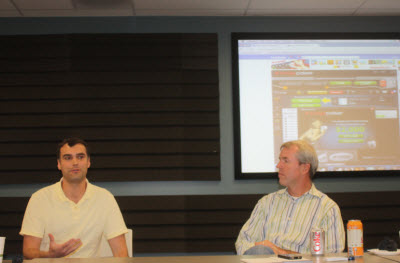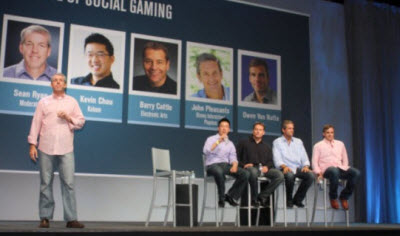Sean Ryan joined Facebook in January, 2011, in order to make sure that the social network understood the games and game publishers that were making Facebook into one of the world’s largest gaming platforms. He is the director of game partnerships at Facebook and has to communicate Facebook’s platform strategy for game companies and tell the broader story about one of Facebook’s most successful application categories. About 235 million of Facebook’s members have played a game in the past month, about 30 million more than a year ago. Mobile gaming has become one of the fastest-growing sectors of the business and Facebook is making it easier for mobile games to get discovered within its mobile app and on Facebook itself.
Here’s part one of our edited interview with Ryan. Part two runs tomorrow.
 GamesBeat: What’s interesting to me about you guys is that you have so much data that you can know everything, right? What do you know about these 235 million players? When you look at all this data, what do you conclude?
GamesBeat: What’s interesting to me about you guys is that you have so much data that you can know everything, right? What do you know about these 235 million players? When you look at all this data, what do you conclude?
Sean Ryan: A key theme is diversity. Diversity in genres of games, where we used to have only one or two genres. Now we have hidden-object games, core games, arcade games, and casual games.
Second is regions. If you look in the Middle East right now, the top game there is this Chinese-made,Turkish-published game called Happy Farm, which is just killing it in the Middle East. We didn’t see that a year or two ago. We saw mostly U.S. developers with non-localized games. This year we’ve seen a rise, particularly in Europe, but around the world, of local or regional developers. Even the U.S. developers have, in many cases, localized their games into 12 or 14 languages.
And then finally platforms. We’ve gone from a desktop-only product to having a mobile platform product. The majority of the top apps and games in the iOS and Google Play stores are using our platform. That’s the general theme we look at from last year. We’ll continue to see that going forward as we try to make sure we have a range of games for a range of players from around the world.
GamesBeat: How do you look back on Facebook gaming history? It seems like the Vampires and the Zombies games are pretty far behind us?
Ryan: Yeah. We were talking about that in the last couple of days. As we see the rise of 3D games on the desktop, whether it’s Unity or Flash 11… I’ve only been here a little less than two years. But if you look back at four years ago, the games that won Social Game of the Year were almost simple word-based games. The vampires or the mobsters or the Big Brain games. Now I look at FarmVille 2 or Jet Set Secret. They’re pretty rich games. There are bigger storylines, better music, deeper gameplay. They’re becoming full-fledged games in a way that I think is compelling. And they’re a much more diverse set of games. I think that’s the greater theme over the last four years.
GamesBeat: I just spoke recently to Blake Commagere about his new startup. He was saying it was interesting how much things have changed, but also how little some other things have changed. Virtual goods are still such a gigantic part of monetizing games on Facebook. He wants to develop new business models, like product placement, which is what he’s doing now.
Ryan: We launched subscriptions a few months ago. That’s being gradually adopted by a set of our partners. But what we’ve found, if you look around the world at both the desktop business and now the mobile business, is that virtual goods or some type of freemium model tend to be the most efficient way to drive revenue from users.
I used to run a music subscription service called Rhapsody. It was about $15 dollars a month. What we would see in those days was that about a third of our users never used it, so they were going to cancel. About a third of our users appeared to run it 24 hours a day. And then a third of our users used it intermittently.
The advantage of virtual goods, versus subscription, is that it tends to match how interested you are in the game and how much you’re willing to either spend time or spend money. That’s often a better match. If I’m going to want to play the game for an hour or two a week, I never have to spend any money. On the other hand, if I really want to get into it, with something like Kixeye’s War Commander games, where you have some really hardcore users…. They end up spending more money than a subscription or a package product might cost.
But I agree with Blake in that I don’t think it’s the only revenue model in the world. Along that diversity theme that I keep going back to, I would say subscriptions are a valid model for a section of games, like chess. You don’t really want to make chess into a virtual goods game. It’s not the way the game is built. They can have advertising-supported models or a la carte paid models or subscription models. Product placement will be interesting. We haven’t seen enough revenue generated from that model yet, but Blake’s a talented guy. I think we’ll continue to see people looking at different types of revenue models for different types of users and different types of games.
That’s what I keep going back to. It’s not just one type of game or one type of revenue model. What we’ve seen in Asia and other parts of the world is that when you build a game correctly around a freemium business model, it can be quite a profitable enterprise. We see that in mobile. When you look at the top 25 grossing games on iOS, in general, the majority of them now are freemium games. That wasn’t true a year ago. And luckily the majority of them, if they’re social games, are using Facebook as their primary login. That’s working well for us.
 GamesBeat: What is your job like these days? What are you talking to game companies about when it comes to games on Facebook?
GamesBeat: What is your job like these days? What are you talking to game companies about when it comes to games on Facebook?
Ryan: [laughing] Depends on the week sometimes. We’ve expanded my team and our investment in gaming overall in the last year. A lot of it’s about hiring, or it has been for the last six months. That’s on a global basis, as we spread around the world making sure we have the right set of developers for different regions, like Asia-Pacific and Europe and now the Middle East and Latin America. Most of what we do is work with a wide set of partners to explain to them what’s coming down the pipe from the platform. We get their feedback on how we can improve the platform, as we look at our product development roadmap for the next six months. That could be things like, “Hey, we’d really like it if you added these payment systems in Saudi Arabia.” It could be, “Hey, it’d be nice if you had new types of stories that showed up in the feed that we’ve started to deploy….” Those are the types of feedback we get from developers about how we can be a better game platform.
Certainly the last 12 months have been all about, “What can you do for us on mobile?” That’s why deploying the mobile platform has been such a large focus for us. In addition, we try to do a better job of explaining to them what is still a pretty fast-moving platform. “These are the next set of improvements coming. Here’s how you can take advantage of them.”
GamesBeat: I don’t know if you had to spend much time on…convincing them that Zynga was not the only company that could be successful on Facebook? And then convincing them that Facebook Credits were a good idea. Was there a period of time where that was a big part of your job?
Ryan: Whenever we make policy changes, part of my team’s goal is to make sure that we explain that to developers and tell them how it’ll affect their business. We want to help them through that. Every day we compete in the world of platform and how our developers allocate resources. We spend a lot of time explaining to them how they can make better games. Not so much on the level of the game itself, but how they can integrate better with us, so that they can have a more successful experience.
We spend a lot of time with, for example, Song Pop, which is a wonderful game. They use our social channels, both on desktop and mobile, better than almost anybody. They’ve been wonderful to work with. They’re incredibly responsive, as are a lot of developers. So the question is, where should you be spending your resources in games? If you want to be mobile only, we absolutely support that. Here’s how to use our mobile platform, especially now that we’ve announced the integration with iOS 6 and our new SDK, which is quite powerful. Here’s why you should adopt that. Here are the benefits. If you want to be on Canvas, just Canvas to desktop, here’s the benefits of that business. Especially with the rise of App Center, which is increasingly how people find games on Facebook.
It’s not just about how many messages you send into the channel. We can help your game be discovered. That’s what we are, a discovery engine. We’re a discovery and distribution engine for both desktop and mobile. So we spend a fair amount of time on that. The best way to be featured in App Center, the best way to make sure you’re using our channels correctly.
GamesBeat: What do you think of the trends in the genres right now?
Ryan: When I came here, that was the one thing I really wanted. I wanted to see a greater diversity of games. The hidden-object games alone, there were probably 10 or 20 by the end of the year. That’s a category that didn’t exist a year before [on social]. I didn’t foresee the rise of arcade and casual. The Bubble Shooters, the Candy Crushes, that type of lighter-weight game. The developers are coming up with great ways to monetize it: power-ups and bonuses.
We certainly spent a fair amount of time on the rise of casino, which is a natural for us. It’s a very social genre. The next six to 12 months, it’s about core and mid-core. Not because the other genres aren’t good, but when we look at openings on the platform where we think we can deliver a powerful experience alongside our developers…. As we start to see Unity and Flash 11 become more prevalent, we can have a really rich gaming experience.
 GamesBeat: Can you explain both of those a bit more? Flash 11.4 is something that will enable new kinds of games.
GamesBeat: Can you explain both of those a bit more? Flash 11.4 is something that will enable new kinds of games.
Ryan: Sure. Flash 11 introduces 3D. So does Unity. Both of those enable the software to tap the graphics processing unit, which means you can get far richer graphics in a web-based game than you could before. FarmVille 2 is a great example. It has 3D effects that you wouldn’t see before. You look at Robot Rising from Tencent, which is a great new game, a MechWarrior-style blow-things-up game.
It’s not just about graphics, though. It’s about storyline. It’s about sound. People forget about sound sometimes. But that’s what we’re seeing now with the success of Kixeye, the success of Plarium in Israel, and some of these smaller studios like Eruptive Games. They’re a small studio out of Vancouver. If you haven’t played Citizen Grim, it is a wonderful game. It’s a zombie shoot-’em-up. You just run around and kill everything, and it is so much fun. That’s where we’re going to see the next wave of richer games. Previously, you could only get those through a large download. Now you can get them in a web-based experience.
You’re seeing this in China already. China is moving away from the very thick client, a two-gig client, to a lighter-weight, thinner client, meaning a web-based game. We’re seeing that here in Facebook as well.
GamesBeat: What do you think is going to happen between 2D games and 3D games? On iOS now, they have pretty good 3D graphics capability, but it still seems like 2D games are the vast majority.
Ryan: Yeah. I went through this debate many other times at many other companies. I remember this on the console. 2D games can be great experiences, like Bejeweled Blitz or Song Pop. These aren’t necessarily better as a 3D game. But that being said, user expectations tend to go up over time as far as the quality of experience they’re looking for. What we’ll see in 3D, which will enable to rise of new games on Facebook — the role-playing games, the MMOs, the realtime strategy games like War Commander and others…. You get a richer experience. It’s suited to those types of games.
2D games are simpler to build, and in many cases appeal to a wide set of users. So it’s not an either-or. It’s not “everything goes to 3D” at all. But until very recently, on Facebook we’ve mostly had 2D games, or 2.5D games with an isometric 2D view. What we’re seeing now is the addition of 3D games. Those can be more expensive to make, because the graphics are richer and the overall experience can be richer, but they provide a more immersive experience. I think you’re going to see some great first-person shooters. If you haven’t seen UberStrike, which was recently revamped and relaunched…. You will see great first-person shooters on desktop Facebook that we didn’t see a year or two years ago.
Look for part two of our interview with Ryan on Saturday morning.
VentureBeat's mission is to be a digital town square for technical decision-makers to gain knowledge about transformative enterprise technology and transact. Learn More

